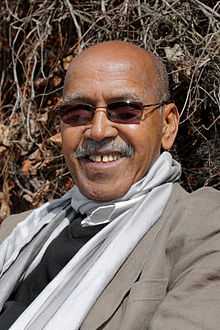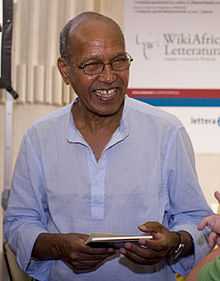Nuruddin Farah
| Nuruddin Farah نور الدين فرح | |
|---|---|
 Farah in 2010 before a lecture at Simon Fraser University. | |
| Born |
Nuuradiin Faarax November 24, 1945 Baidoa, Somalia |
| Occupation | novelist, essayist, professor |
| Nationality |
|
| Ethnicity | Somali |
| Alma mater | Panjab University |
| Subject | nationalism, colonialism, feminism |
| Notable works | From a Crooked Rib, Maps, Gifts, Secrets |
| Notable awards | Kurt Tucholsky Prize, Lettre Ulysses Award, Neustadt International Prize for Literature, Premio Cavour, St. Malo Literature Festival Prize |
| Spouse |
Chitra Muliyil (1970-72) Amina Mama (1992-present) |
| Children |
Koschin (born 1971) Abyan (born 1993) Kaahiye (born 1995) |
Nuruddin Farah (Somali: Nuuradiin Faarax, Arabic: نور الدين فرح) (born November 24, 1945) is a prominent Somali novelist. He was awarded the 1998 Neustadt International Prize for Literature.
Personal life
Farah was born in 1945 in Baidoa, Somalia. His father was a merchant and his mother a poet.[1] Farah was the fourth eldest boy in a large family.[2] He hails from the Ogaden Darod clan.[3]
As a child, Farah frequented schools in Somalia and adjacent Ethiopia, attending classes in Kallafo in the Ogaden. He studied English, Arabic and Amharic. In 1963, three years after Somalia's independence, Farah was forced to flee the Ogaden following serious border conflicts. From 1966 to 1970, he pursued a degree in philosophy, literature and sociology at Panjab University in Chandigarh, India.[2]
Farah's sister, Basra Farah Hassan, was a diplomat. She was killed in a bombing in January 2014 while working with the United Nations in Kabul, Afghanistan.[4]
Farah has two sons and a daughter.[5] He currently resides in Minneapolis, Minnesota, and Cape Town, South Africa.[6]
Literary career

After releasing an early short story in his native Somali language, Farah shifted to writing in English while still attending university in India. His first novel, From a Crooked Rib (1970), told the story of a nomad girl who flees from an arranged marriage to a much older man. The novel earned him mild but international acclaim. On a tour of Europe following the publication of A Naked Needle (1976), Farah was warned that the Somali government planned to arrest him over its contents. Rather than return and face imprisonment, Farah began a self-imposed exile that would last for twenty-two years, teaching in the United States, Germany, Italy, Sweden, Sudan, India and Nigeria. In 1990, he received a grant from the German Academic Exchange Service and moved to Berlin. In 1996, he visited Somalia for the first time in more than twenty years.[7]
Farah describes his purpose for writing as an attempt "to keep my country alive by writing about it".[1] His trilogies of novels - "Variations on the Theme of an African Dictatorship" (1980–83) and "Blood in the Sun" (1986–99) form the core of his work. Though Variations was well received in a number of countries, Farah's reputation was cemented by his most famous novel, Maps (1986), the first part of his Blood in the Sun trilogy. Maps, which is set during the Ogaden conflict of 1977, employs the innovative technique of second-person narration for exploring questions of cultural identity in a post-independence world. He followed the novel with Gifts (1993) and Secrets (1998), both of which earned awards. His most recent trilogy comprises Links (2004), Knots (2007) and Crossbones (2011).
Besides literature, Farah is an important scholar within Somali Studies. He serves on the International Advisory Board of Bildhaan: An International Journal of Somali Studies, published by Macalester College.[8]
Awards
Farah has garnered acclaim as one of the greatest contemporary writers in the world.[2] Having published many short stories, novels and essays, his prose has earned him, among other accolades, the Premio Cavour in Italy, the Kurt Tucholsky Prize in Sweden, the Lettre Ulysses Award in Berlin, and in 1998, the prestigious Neustadt International Prize for Literature. In the same year, the French edition of his novel Gifts also won the St. Malo Literature Festival’s prize.[5] In addition, Farah is a perennial nominee for the Nobel Prize in Literature, which is one of the only major literary prizes, for which he is eligible, that he has yet to win.[9]
Selected bibliography
Fiction
- Farah, Nuruddin (1965). Why die so soon?. Novella
- — (1970). From a crooked rib. London: Heinemann.
- — (1976). A naked needle. London: Heinemann Educational.
- — (2000). Territoires. Serpent à Plumes.
- Variations on the Theme of an African Dictatorship trilogy
- Farah, Nuruddin (1979). Sweet and sour milk. London: Allison & Busby. Reprints: Heinemann, 1980; Graywolf Press, 1992.
- — (1981). Sardines. London: Allison & Busby. Reprints: Heinemann, 1982; Graywolf Press, 1992.
- — (1983). Close sesame. London: Allison & Busby. Reprints: Graywolf Press, 1992.
- Blood in the Sun trilogy
- Farah, Nuruddin (1986). Maps. London: Pan. Reprints: Arcade, 1999.
- — (1993). Gifts. London: Serif. Reprints: Arcade, 1999; Kwela Books, 2001.
- — (1998). Secrets. New York: Arcade.
- Return to Somalia trilogy
- Farah, Nuruddin (2003). Links. Cape Town: Kwela Books. Reprints: Riverhead Books, 2004; Duckworth, 2005.
- — (2007). Knots. New York: Riverhead Books.
- — (2011). Crossbones. New York: Riverhead Books. Reprints: Granta, 2012.
Short fiction
- Farah, Nuruddin (December 22–29, 2014). "The start of the affair". The New Yorker 90 (41): 130–139.
Plays
- Farah, Nuruddin (1965). A dagger in a vacuum.
Non-fiction
- Farah, Nuruddin (2000). Yesterday, tomorrow : voices from the Somali diaspora. London: Cassell.
References
- ↑ 1.0 1.1 Maya Jaggi (21 September 2012). "Nuruddin Farah: a life in writing". The Guardian. Retrieved 21 September 2012.
- ↑ 2.0 2.1 2.2 Prentice-Hall, Inc. (editor) (2001). Literature Lover's Companion: The Essential Reference to the World's Greatest Writers - Past and Present, Popular and Classical. Prentice Hall Press. p. 200. ISBN 073520229X.
- ↑ Wright, Derek. "The Novels of Nuruddin Farah". Wardheernews. Retrieved 19 August 2014.
- ↑ "Basra Farah, sister of Nuruddin Farah, among casualties of Kabul attack", Somalia Online, January 18, 2014.
- ↑ 5.0 5.1 Lettre Ulysses Award for the Art of Reportage - Nuruddin Farah.
- ↑ Farah, Nuruddin (2012). Crossbones. Granta. ISBN 9781847086099. Retrieved 26 June 2014.
- ↑ The Penguin Speaker's Bureau. Penguin Group
- ↑ "Bildhaan - Editorial Board". Macalester College. Retrieved 25 February 2014.
- ↑ Michael Eldridge, "The Novels of Nuruddin Farah (review)", Africa Today, Vol. 52, Number 1, Fall 2005, pp. 141–43.
Further reading
- Alden, Patricia, & Louis Tremain. "Nuruddin Farah." Twayne's world authors series v.876. New York: Twayne Publishers, 1999.
- Wright, Derek. "The Novels of Nuruddin Farah." Bayreuth African Studies Vol. 32, 2nd edition, Bayreuth: 200421:34
- Lettre Ulysses Award - Nuruddin Farah
- Maya Jaggi, "Bitter crumbs and sour milk - a nation betrayed" (profile of Nuruddin Farah), The Guardian, 18 April 1993. Accessed 27 June 2012.
External links
| Wikimedia Commons has media related to Nuruddin Farah. |
| Wikiquote has quotations related to: Nuruddin Farah |
|